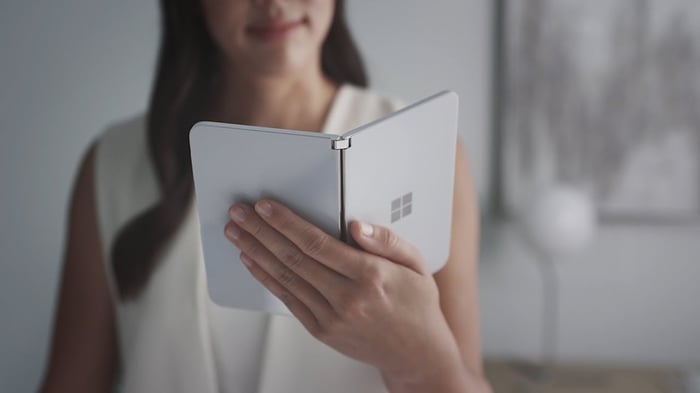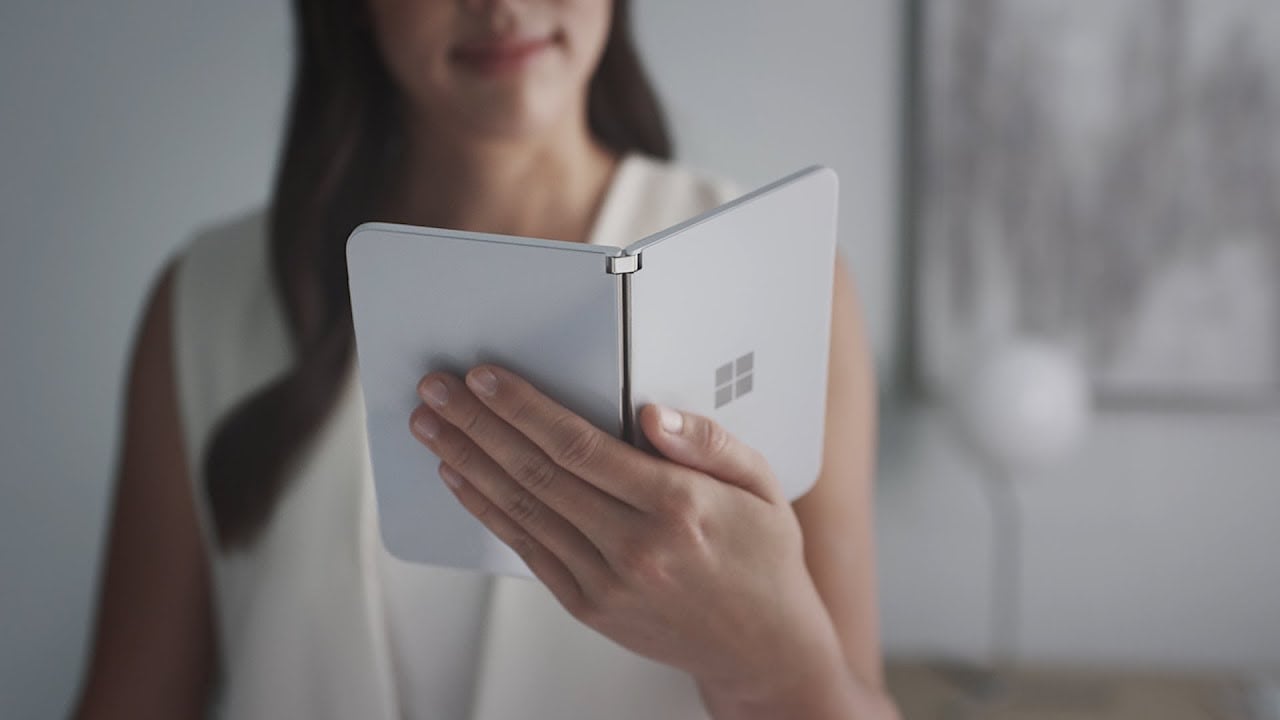As CES 2020 and other recent events indicate, technology is set to change business and work culture in some pretty impactful ways.
Large enterprises are no longer the only types of businesses that need to pay attention to the newest innovations in tech--even small business owners should begin to talk about their technology strategy for this new decade.

Microsoft Surface Duo 2020
CES 2020 was bigger than ever.
CES 2020, the world's biggest consumer electronics show, just wrapped in Vegas last week, and members of the Global Fortune 500 and over 200,000 industry professionals from all over the world attended.
What did they learn?
1. People are going to be taking flying taxis, eating fake pork, and buying robots to teach their kids while a drone delivers them pizza.
2. Every company will have the opportunity to be a "tech company" with all of the advancements in business technology coming down the line.
Technology will become more embedded into our surroundings.

Mui Lab 2020
Companies like Mui Lab and UltraSense are re-imagining the touch interface. By using sound wave or leveraging sustainable materials like wood, companies are building smart interfaces that fit more organically with our natural environment.
Instead of using a phone to unlock a door or turn on a light, imagine running a finger over a simple wood panel in your house to initiate all sorts of internet-of-things-type tasks?
These longer lasting, more subtle interfaces will probably begin appearing in more places like hotel reception desks, vehicles, and appliances later this year.
By getting rid of physical buttons on devices (and in some cases the devices themselves) we are entering a new era of technology where there's less to carry, but more capabilities.
More foldable devices are on the way.
2019 saw the first foldable phones reach the market. This trend of foldable tech seems to be growing, as CES 2020 welcomed foldable laptops, phones and touchpads from Intel, Samsung, Lenovo, Microsoft, and Dell.
The key advantage to these devices seems to be versatility in portability without sacrificing the viewing experience--plus screens that bend just look improbably cool.

Intel 2020
This technology is still in its early stages, and there will need to be improvements made in durability and affordability, but big tech's investment into foldable devices reveals that the future of work machines will be flexible. You won't need to carry a work laptop, smartphone, and touchpad--but could have a flexible hybrid device capable of bending itself into something resembling any of those things.
Wearable technology will become a bigger part of the workday.
Many advances in wearable tech were displayed at CES 2020. While this market has a huge health and fitness following already, it is easy to see how tech capable of tracking heart rates and heat mapping travel patterns can be applied to worker productivity.
Samsung is one of the companies that wants to work with businesses to create wearable solutions for workers.
While this feature promises to make the service industry more efficient--it also raises interesting privacy concerns. Workers will have to comply with having their biometrics measured at work. Managers will have to be upfront about how they are using this data as it applies to worker evaluations and HR areas-such as insurance benefits.
Technology has ambitious plans for the next decade
Many of the world's biggest brands have revealed they plan to use technology in ways that transcend their typical offers. Toyota showed designs at CES for its "city of the future" at the base of Mt. Fuji in Japan.

"Woven City" Toyota 2020
The "Woven City" plans to weave autonomous vehicles, helpful robots, smart homes and artificial intelligence into a society of thousands that will act as a prototype community for a new sustainable tech-driven way of life. “I truly believe this is a project that can benefit everyone. Not just Toyota,” a spokesman for the company said.
Of course, with all of these utopian dreams, comes the reality of more data collection and the prospect of who really owns personal information and how should they protect it? Data protection is moving in the right direction, but still needs to catch up with data collection and its reach--fast.
Data privacy is starting to be addressed-finally
Abilities in AI and machine learning are becoming a reality in 2020 that were practically unimaginable less than ten years ago. Companies that learn to better leverage technology in 2020 and beyond will have incredible opportunities to add value, connect their workers and market their offers to the public. As Satya Nadella, CEO of Microsoft said at his recent keynote at the National Retail Federation's 2020 Vision: "You can’t be cool by association with a tech friend — you have to be cool on your own. You have to take pride in the digital capability that you have built.”
And with that tech coolness, comes a big responsibility.
As fitness trackers, AI-powered learning tools, and personalized smart tech continue to invade every aspect of our lives, it is unacceptable for any company (even a startup) to not have a plan for storing and using the personal data it collects. And consumers have a right to know exactly what that plan is. Every business must see itself as being responsible for privacy protection. The way company's use and secure customer information will become a new competitive benchmark in the marketplace. This starts by enabling experts in the field of IT security.
The public has their part too.
People should no longer agree to sign away their privacy for the promise of faster checkouts, better productivity and more convenience.
Technology is making the world more productive and more vulnerable
New technology continues to create more transparency and opportunities in every aspect of business: from employee wellness, to customer engagement and energy consumption--even streamlining vendor supply chains. Hopefully, the businesses that rise to the top of their respective industries will be the ones that prioritize the safe and ethical use of the new powerful tech available to them.

